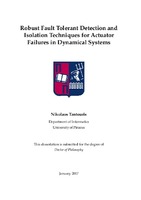| dc.description.abstractEN | This doctoral dissertation addresses the inefficiencies of the currently applied ‘Fault
Detection and Isolation’ (FDI) techniques, calling for the generation of algorithms
which can handle a wide variety of fault profiles and scenarios more effectively. The
overarching objective of this dissertation was to develop alternative state-of-the-art
methodologies which can be robust, simple to implement, and able to function
reliably, in real-time and on a continual basis. To this effect, three novel algorithms
fulfilling all the above requirements are derived and presented herein. These three
filters are applied to the Guidance Navigation and Control (GNC) designs for
autonomous spacecraft and validated within the Lisa Pathfinder (LPF) context in
a simulation environment provided by the European Space Agency (ESA). The
theoretical basis for their development and application is also amenable to other
spacecraft, since robust FDI is critical for operational autonomy. The presented
FDI techniques, namely the Diagnosis, Euresis and Euphoria Filters, are generated
over two individual phases. Following a comprehensive literature review of the
subject matter, initially, two fundamentally different model-based approaches are
formulated and pursued, reflective of the two main trends of the existing modelbased
methods: the geometric approach and the multiple model approach. The
novelty of the Diagnosis Filter (geometric approach) lies in that, in contrast to
conventional methods, it does not only generate structured residuals, but also it
employs directionality rather than residuals’ magnitude as a diagnostic tool for faults
(deterministic approach). This filter exhibits remarkable robustness and performs
exceptionally well, regardless of the thruster’s failure severity. In comparison, the
Euresis Filter (multiple model approach) exhibits similar robustness, albeit for total
failures only. However, it has the advantage of being applicable to non-linear
design models unlike the Diagnosis Filter. During the second phase, directionality is
incorporated in another optimisation-based geometric approach (i.e. Euphoria filter).
In this case, directionality is not designed in at the outset but it is rather recovered
by an adjoint operation on the H2 filter residuals (optimal stochastic approach). The
Euphoria Filter outperforms the other two in most evaluation criteria and it can
be applied in both linear and non-linear FDI scenarios. In summary, this thesis
addresses the weaknesses of the currently applicable FDI techniques, outlines the
objectives of this dissertation, and presents three novel FDI methods, extensively
tested via Monte Carlo simulations and ultimately validated on the LPF model. The
thesis concludes with recommendations for future work, potential developments in
the field and alternative applications of these techniques in other domains such as
IoT and Cyber-Physical systems. | el |



